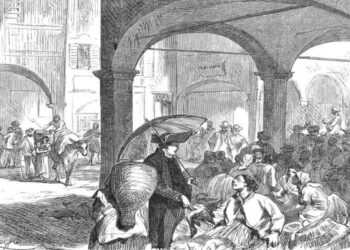As the courtroom drama unfolds in Manhattan, the final stage of former President Donald Trump’s historic hush money trial concludes with a flurry of legal arguments and a jury poised to deliberate on a verdict that could have profound implications.
Trump faces 34 felony counts of falsifying business records, accusations centered around a purported $130,000 payment to adult film star Stormy Daniels.
This trial, significant in its potential to influence Trump’s political future, delves into the complexities of legal and ethical boundaries.
The allegations suggest a deliberate attempt to obscure the truth during the pivotal moments of the 2016 presidential campaign.
The prosecution argues that these acts were part of a broader strategy to manipulate public perception and maintain a facade of an untarnished reputation crucial for electoral success.
As the details of the payment and its concealment come to light, the trial paints a picture of a campaign willing to bend legal frameworks to secure electoral advantage, raising critical questions about integrity and accountability in political campaigns.
The Prosecution’s Conviction
Prosecutor Joshua Steinglass delivered a marathon closing argument, lasting over five hours, meticulously dissecting the timeline and intricacies of the alleged cover-up.
The prosecution aimed to cement the narrative of a calculated scheme to suppress damaging stories during the critical weeks leading up to the 2016 presidential election.
Central to their argument is the claim that these payments to Cohen logged misleadingly as “legal expenses,” were deliberate acts of deception.
Steinglass presented compelling evidence, including financial documents, witness testimonies, and a series of incriminating communications between Cohen and Trump.
These documents purportedly show that Cohen was reimbursed for the payment to Daniels, with additional funds to cover taxes and bonuses disguised as legal fees.
This intricate detailing aimed to prove that Trump not only orchestrated these transactions but also closely monitored them, ensuring their secrecy and strategic timing relative to the election.
The Defense’s Counterargument
On the other side of the courtroom, Trump’s defense, led by attorney Todd Blanche, staunchly refuted the charges, arguing that the payments were legitimate legal fees and accusing the prosecution of political motivation.
Blanche’s three-hour presentation painted Trump as a victim of a prosecutorial witch hunt, challenging the credibility of key prosecution witness Michael Cohen, whom he labeled a “serial liar.”
Blanche argued that Cohen’s financial gain from his book deals and public appearances tainted his testimony, suggesting his narrative was crafted to harm Trump and enhance his own public profile.
Moreover, the defense highlighted the absence of direct evidence linking Trump to the command to falsify records, asserting that the documentary evidence presented was routine financial management.
Legal and Public Repercussions
The implications of this trial extend far beyond the courtroom. A conviction could potentially derail Trump’s aspirations for a return to the White House in the upcoming election despite not precluding him from running.
The outcome heavily influences public and political perceptions, as Trump himself denounced the trial as a “dark day in America” and an orchestrated attack against him.
Throughout the trial, the media highlighted Trump’s commentary and reactions, including dismissals of the proceedings as “boring.” These shaped public perception. His claims of political persecution resonated with his base, potentially galvanizing support amidst the legal turmoil.
Witness Testimonies and Legal Strategies
The trial has featured testimonies from nearly two dozen witnesses, shedding light on the inner workings of Trump’s campaign and personal dealings.
The defense attempted to undermine the prosecution’s case by attacking Cohen’s reliability and motives, portraying him as someone seeking revenge against Trump.
They also emphasized that the payments were a private matter unrelated to the election, framing the charges as an overreach by the prosecution.
The prosecution, however, leaned heavily on the narrative that Trump’s actions were motivated by electoral considerations, aiming to suppress damaging stories in the wake of the “Access Hollywood” tape. This narrative was bolstered by testimonies that painted a picture of a campaign in crisis, seeking to control damage at all costs.
Juror Deliberation and Legal Standards
As the jury deliberates, they must reach a unanimous verdict, guided by the stringent standard of “beyond a reasonable doubt.
” The case’s complexity is underscored by detailed financial records, witness testimonies, and the legal interpretations presented by both sides.
The decision hinges on whether the jurors believe that Trump actively participated in a scheme to mislead the public and obstruct justice.
As the world watches, the trial against Donald Trump encapsulates a pivotal moment in American legal and political history. Whether this will result in a historical conviction or a dismissal remains in the hands of the jurors.
What is clear, however, is that the outcome will resonate far beyond the confines of the courtroom, potentially influencing the political landscape and public opinion on accountability and justice in high offices.
The trial tests the legal boundaries of presidential conduct and sets a significant precedent for how such cases are perceived and handled in the future.
It highlights the ongoing debate over the intersection of personal actions and public accountability, especially concerning those in the highest positions of power.







